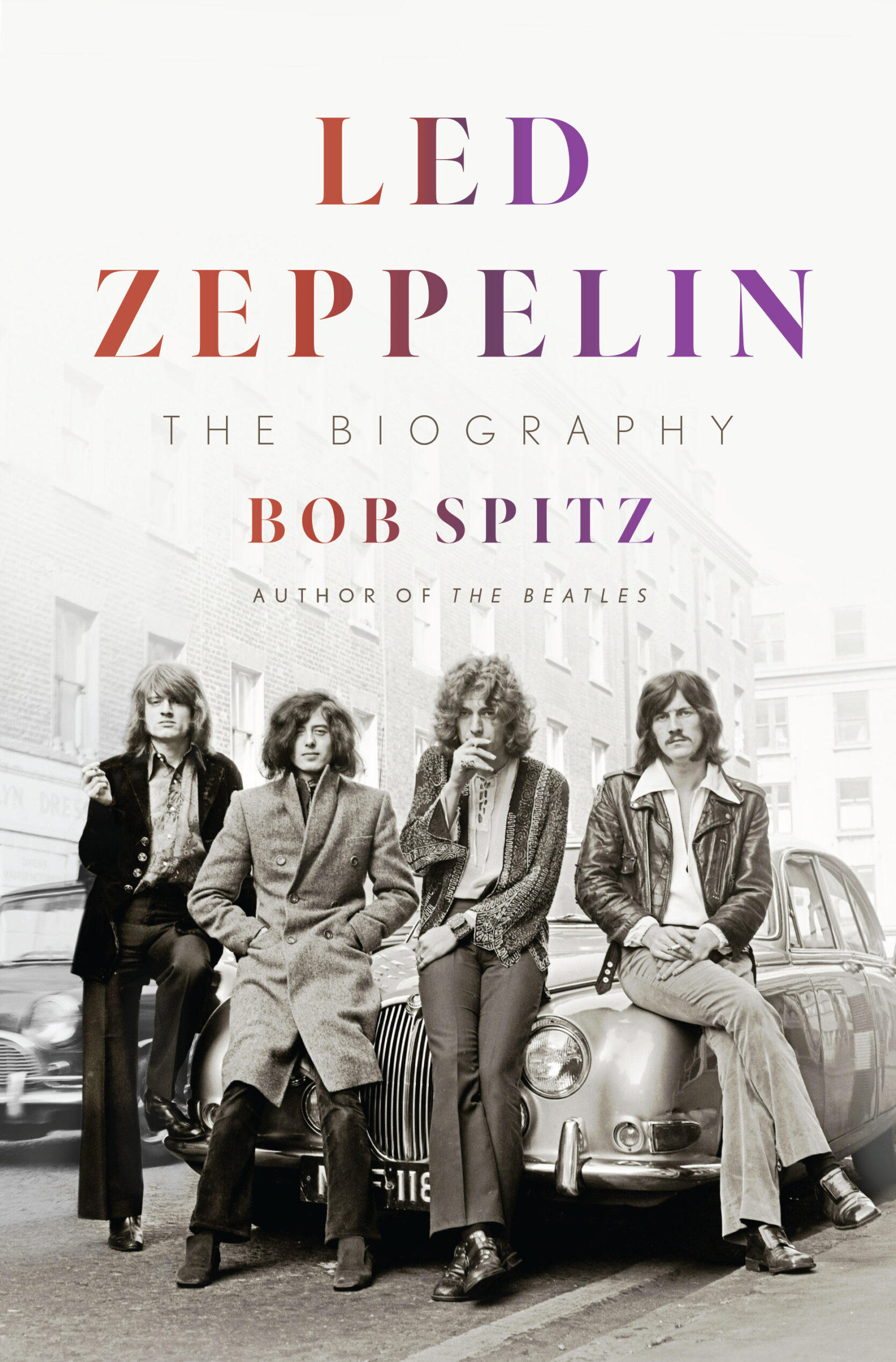Sparked by the 50th anniversary of Led Zeppelin IV and “Stairway to Heaven,” seasoned, deep-dive journalist and book author Bob Spitz set out to write the ultimate account of one of the most legendary bands of rock ‘n roll.
The author of previous bestsellers The Beatles: The Biography, and Dearie: The Remarkable Life of Julia Child, Spitz was undeterred by the more than 100 books already out there on the band. And he took his time to get things right. “I spent five years tracking people down and writing this book, following every lead, and there are 35 pages of source notes at the back of the book, so the reader will know exactly where every quote and detail comes from.”
I spoke with Bob about the reason his is the essential Zep biography, why they’re not “golden gods”, and why he was, as he says, the “perfect” person to write this book.
SPIN: Why a book about Led Zeppelin in 2021?
Bob Spitz: The easy answer is that it’s the 50thanniversary of LZIVand “Stairway.”But the more complex answer is similar to why I wrote The Beatles. There were 700 books written about the Beatles when I began to research, but all of them were based on the Hunter Davies book and Paul confided to me that they’d made up half those stories to protect their families, wives, and girl-friends from some of the grittier details. So, I set out to set the record straight by talking to every eyewitness and source, 355 in all. Voila: I produced a completely different story than anyone had ever heard, all based on fact, not legend.
With Zep, I read the litany of things written about them (about 130 books, etc.) and found most of them either written by fanboys or hacks. Richard Cole’s book has been largely discredited, and Hammer of the Gods is nothing more than a chronicle of bad behavior in which the “author” places himself at the center of the stories. None of those books were sourced, so we have no idea where any of the quotes came from or were even reliable. And several of the more “authoritative” Zep books featured “recreations” of scenes based on what the “authors” fantasized happened.
Zep needed a definitive, authoritative biography. I started from scratch, with Jimmy Page, of course, and found his best friend/next-door neighbor who bought all the blues records that Jimmy learned to play from and was there when 16-year-old Jeff Beck came banging on his door, and was at Jimmy’s first gigs. I talked to Glyn Johns who also grew up a few streets from Jimmy and “produced” (the real story is in the book) the first Zep album. I spoke with several artists who were session players with Jimmy and to Shel Talmy who hired Jimmy to play on the earliest Who and Kinks singles. And to Terry Reid, who Jimmy initially chose to be Zep’s vocalist but was instrumental in bringing Robert and Bonzo into the band. And everything transpired from those beginnings.
So what’s new in your book?
This book takes you behind the scenes of the band’s entire history, from their earliest, teenage bands to the formation of LZ to each of their recording sessions, their tours, and every important meeting they ever had. It relies solely on eyewitness accounts. It’s the first book in which the reader will be right there with the band as they create their music at rehearsals and in the studio.
And because I’m a musician, I was able to explain, in laymen’s terms, how the music evolved. I also listened to the album with other musicians — for example, Carmine Appice explained to me from a drummer’s perspective how Bonzo played those incredible fills. Roger Mayer, the inventor of the fuzz box (and Jimmy’s boyhood friend) detailed how he created the effect (now standard for all guitar players) for Jimmy and Jeff Beck. I even spoke to the historian at Marshall Amps who gave me incredible insight of how rock ‘n roll in the UK shifted from tiny Vox amps to Marshall stacks (responsible for much of Zep’s sound).
There are little gems everywhere: for instance, you’ll be with Jimmy Page the night he meets Mick and Keith (pre-Rolling Stones) when they go to hear a guitar player billing himself as Elmo Lewis (really Brian Jones!), which is the night Mick and Keith meet Brian as well. You’ll be with Robert and Bonzo as they bounce from band to band in the Midlands, along with characters from the Moody Blues, the Move, Fairport Convention, plus Jim Capaldi, Stevie Winwood, Dave Mason, Steve Gibbons, Bryan Ferry, and the two “losers” who could never get a Saturday-night gig, Ozzy and Tony (later Black Sabbath). Jerry Greenberg laid out exactly how Peter Grant and Jimmy got to Atlantic Records. (Clive Davis explained how he and Columbia Records got fucked by them!)
Phil Carson, who was Atlantic’s liaison with Zep, guided me through their entire history with the label and his days on the road with them. Maggie Bell gave me a blow-by-blow account (no pun intended) of her relationship with the band. Journalists from Rolling Stone, NMEand Melody Maker, which covered Zep, explained their interactions. Five people spilled the beans on who robbed the Drake Hotel safe. The lawyer who represented John Gotti and Frank Lucas described how he got Peter Grant and Richard Cole out of jams. And, yes, I spoke to many of the celebrated groupies whose escapades with the band have become legend. You’ll be in Peter Grant’s hotel room with the band following the famous Oakland punch-up when they made plans to skip town but were subsequently arrested. And you’ll be in the darkened bedroom with Benji Lefevre when he discovers Bonzo’s body. There is more new material — much more — but then I’d have to start charging you by the word! ($4 a word, the amount Bob Guccione Jr’s dad paid me when I wrote for him back in the day.)
Seriously, I hope this gives you a taste.
Do you know the band personally?
No, I don’t know them. They were prepared to speak with me when #MeToo landed, and suddenly they weren’t talking to anyone anymore. But I’ve always felt that the musicians, who live in a bubble, are the most unreliable narrators. I left it to everyone else, those who were with them every step of the way, to fill in the details. Of course, I was despondent over losing the band members, but was reading a copy of David McCullough’s John Adams bio when I realized he never spoke to Adams! So, it was time to get to work and track down about 250 eyewitnesses to the Zep story.
If Led Zep were formed today—would they be a success?
Who can say? They were the sound of the ‘70s and define that era so well, just as The Doors, Love, the Spoonful, the Beatles, etc., were the sound of the ‘60s, and how Billie Eilish and Taylor Swift are the sound of today. I believe that each band serves as a chronicle of their times, not only regarding the music but the cultural context as well. Would the Temptations be a success in the era of hip-hop? Your guess is as good as mine.
Has Jimmy Page expressed consciousness at the reputed inappropriateness of his relationships with underage girls?
Not that I’ve ever heard. It’s a subject he carefully avoids. And many people associated with Led Zeppelin continue to say, “Those girls pursued the band, not the other way around.” Or “Those girls got what they wanted.” Rock bands have largely escaped owning up to the bad behavior, but as George Harrison wisely noted: “All things must pass.”
What’s the biggest misnomer about Led Zeppelin?
That they were golden gods. They worked their asses off and hit the cruel road so often that it’s a wonder even three men made it to the finish line and lived to tell about it. Being Led Zeppelin, maintaining their image and status and sound, was brutal. They put their backs (and other appendages) into it and that fabulous songbook they left us with is evidence of the hard work.
Which of the legends are actually myths?
Hard to say. I mean, what are the legends? — that they fucked underage girls, they gobbled prodigious amounts of drugs, they tormented a poor sad girl with a mud shark, their manager abused fans, Jimmy Page dabbled in the occult, Bonzo was “the Beast?” Guilty, guilty, and guilty.
What were your big discoveries when writing the book?
I think I covered this in the answers to your first two questions. But I will admit to this discovery: When my editor asked me to write this book, I had upwards of 20,000 vinyl albums in my collection and not a single Led Zeppelin LP. If he had asked me to name any of their songs I might have come up with “Whole Lotta Love” and “Stairway,” but that’s about it. I was on the road with Bruce Springsteen during Zep’s heyday and our musical paths didn’t cross. That said, I was the perfect person to write this book. It gave me a fresh perspective. At the outset, I was an empty vessel, without any preconceived notions about the band, and I let the facts of their story and the music fill me up. I spent months — years! — listening to their music with an open mind, and often open-mouthed.
Are there any real rock stars today (by Led Zep standards)?
Nope. Prince, alas, was the last.





